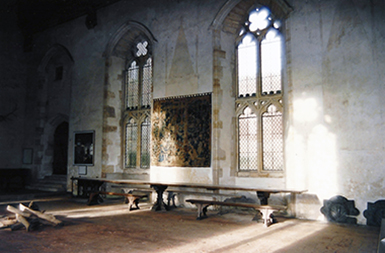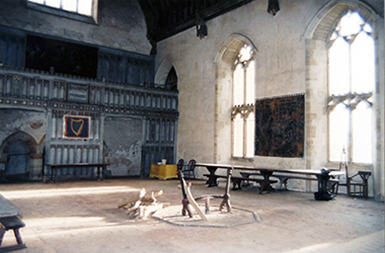 |
  |
 |
 |
  |
 |
 |
 |
"One of the grandest rooms in the world," Penshurst's Great Hall, completed in 1341 (more than 150 years before Columbus got his boats!), is a wonder of medieval architecture. Elizabethan bards had certainly performed here and it was only a half hour, by train, from central London. The setting could not be more perfect. The Baron's Hall was high enough, long enough and wide enough for both the production crew and audience, and came complete with just the hook I had been seeking. Penshurst Place was the birthplace of Elizabethan soldier, courtier, statesman, poet and patron of scholars and poets, Sir Philip Sidney, whose Defence of Poesy, still read today by English majors, might have been written in defense of GRUMPUSS. Sir Philip's works were not printed during his lifetime, but they circulated widely in manuscript. His Defence of Poesy a response to two attacks by Stephen Gosson on stage playsargues that the purpose of poetry (under which name he encompasses virtually all of the creative arts), is to delight and to teach. This it does better than any of the other disciplines, because it appeals to both the bright and the dim-witted, moving both most effectively toward wisdom. In 1585, while serving as the governor of Flushing, Sir Philip was wounded in a skirmish with Spaniards at Zutphen. His death, three weeks later, led to a month of mourning in his beloved England and he became the first of only three commoners granted state funerals by the crown (the other two being Lord Nelson and Sir Winston Churchill). I decided to stage the World Premiere of GRUMPUSS in the Baron's Hall at Penshurst Place in honor of Sir Philip Sidney's celebrated essay, a work that paved the way for William Shakespeare and is a source of comfort to poets and playwrights to this day. That's not what happened, but it seemed like a good idea at the time. |
PRODUCER'S NOTE I planned to hire a TV actor to tell the tale and thought that with Penshurst Place and the Defence of Poesy theme, GRUMPUSS could proceed through a limited partnership offering or as part of a complete production, distribution and merchandising package with a major studio or broadcaster. But over the next three years, GRUMPUSS was rejected by every PBS, network and cable outlet I contacted, each claimeingto personally love it and wishing me the best of luck, but none believed it was commercial, some even claiming it was way over the heads of their audiences. I was dumbfounded. What demographic study made PBS believe they were appealing to such benighted audiences? My little girl had fallen in love with GRUMPUSS when she was only six! Obviously, none of my contacts had ever read Sir Philip's essay. I might have given up on GRUMPUSS had it not been for a surprising letter from an English professor at Bridgewater State College in Massachusetts . . . |
| BACK | RETURN TO GRUMPUSS LEGACY MENU | NEXT |
|---|